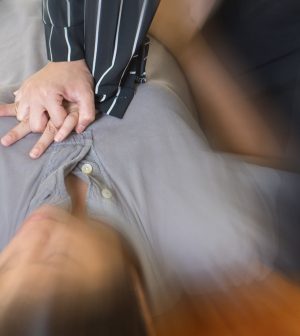- Could Your Grocery Store Meat Be Causing Recurring UTIs?
- Are You Making This Expensive Thermostat Error This Winter?
- Recognizing the Signs of Hypothyroidism
- 10 Strategies to Overcome Insomnia
- Could Artificial Sweeteners Be Aging the Brain Faster?
- Techniques for Soothing Your Nervous System
- Does the Water in Your House Smell Funny? Here’s Why
- Can a Daily Dose of Apple Cider Vinegar Actually Aid Weight Loss?
- 6 Health Beverages That Can Actually Spike Your Blood Sugar
- Treatment Options for Social Anxiety Disorder
Naloxone Might Help Revive People After Opioid-Linked Cardiac Arrest

The overdose-reversing drug naloxone can help save the lives of people whose hearts have stopped due to an opioid OD, a new study shows.
Naloxone rapidly reverses opioid ODs by blocking the ability of opioids to bind with receptors in the brain, researchers said in background notes.
The drug typically saves lives by restoring normal breathing to a person who’s stopped breathing due to an opioid OD, researchers said.
But opioids can also cause cardiac arrest. During an overdose, the heart can suddenly stop beating.
“The incidence of drug-related cardiac arrests has skyrocketed in the past two decades, and there is an urgent need for evidence to guide possible naloxone use in this circumstance,” said researcher Dr. David Dillon, an assistant professor of emergency medicine with the University of California, Davis.
Most cardiac arrests occur due to heart attacks or electrical problems in the heart, but opioid OD-related cardiac arrests are a major cause of death among adults ages 25 to 64, researchers said.
More than 15% of opioid OD cases treated by paramedics involve cardiac arrest, the American Heart Association says.
For this study, researchers evaluated information on nearly 8,200 patients treated for opioid-related cardiac arrest in three Northern California counties between 2015 and 2023.
One out of nine OD cardiac arrest patients treated with naloxone had their heart spontaneously restart and blood circulation resume, researchers found.
One patient survived and was discharged from the hospital for every 26 treated with naloxone, results show.
The new study was published Aug. 20 in the journal JAMA Network Open.
“Surprisingly, our findings showed that naloxone was associated with improved clinical outcomes in both drug-related cardiac arrests and non-drug related cardiac arrests,” Dillon said in a university news release. “This is important because it adds to our understanding about the effectiveness of naloxone for drug-related, out-of-hospital cardiac arrest.”
More information
The American Heart Association has more about opioid OD-related cardiac arrests.
SOURCE: University of California, Davis, news release, Aug. 20, 2024
Source: HealthDay
Copyright © 2026 HealthDay. All rights reserved.










